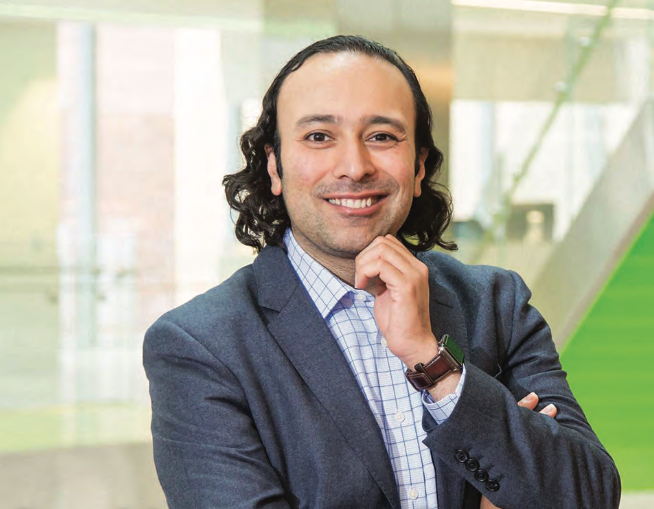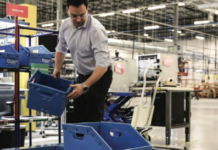
The Lazaridis Scale-Up Program is just one of the ways in which the Lazaridis School of Business & Economics is making a national impact on Canadian business.
Karn Manhas’ entrepreneurial career started with an argument. “I was debating with a friend whether natural ingredients are as effective at controlling pests as synthetic chemicals,” he recalls.“There’s this belief that anything natural has to be ‘snake oil.’ But that makes no sense to me from a biological or evolutionary point of view.”
Determined to prove natural pest control is not only possible, but potentially more effective and efficient than man-made chemicals, Manhas put his background in genetics and biotech to work founding Terramera, a Vancouver-based biopesticide company. His first product was a 100 per cent effective, non-toxic bedbug treatment made from oil extracted from the fruits and seeds of the evergreen neem tree. Terramera has grown into an 85-person business and expects to grow revenue by 50 to 100 per cent in the coming year as it seeks to revolutionize global food production.“Our goal is to replace the synthetic chemicals used for fertilizer or pest control with more-effective, natural alternatives so we can make food healthier and more affordable and feed the world,” says Manhas.
His vision of fertilizers made with all- natural ingredients has earned Terramera plenty of attention. But before the revolution can begin, Manhas needs to figure out his org chart, hire the right people and learn how to build better customer relationships.Turns out there’s more to changing the world than simply having a brilliant idea.You also need to know how to grow your company.“If you don’t scale up properly,” he warns, “you’ll hit a ceiling. Or worse, you’ll implode.”
Manhas is part of Canada’s vibrant tech community that’s bursting with eager young minds and great ideas – driven, in large part, by a top-notch university system that produces plenty of raw talent. Despite all the excitement surrounding our abundance of startup efforts, however, the relative paucity of Canadian unicorns − globally dominant tech firms valued at US$1 billion or more – is a sign we lack some key elements to turn all those brilliant ideas into world-beating, flag-waving, high-growth companies.
It’s a deficiency Wilfrid Laurier University’s Lazaridis Institute for the Management of Technology Enterprises was born to solve. Terramera is one of 10 young tech firms selected to participate in this year’s Lazaridis Scale-Up Program. Funded by famed Canadian tech entrepreneur Mike Lazaridis, with matching funds from the Ontario government, the Lazaridis Institute is also building a national database of innovative startups and scale- ups, a world-class research program, and curriculum for today’s tech companies and tomorrow’s leaders.
The Lazaridis Scale-Up program functions as a sort of gifted class for the nation’s most-promising young tech entrepreneurs.These are companies that have outgrown the startup phase and need support to scale up to the next phase of growth.With a customized menu of mentorship, networking and expert advice, the program is designed to push Canadian firms toward success in global markets.
Prior to launching in 2016, the Lazaridis Institute surveyed key players in the tech sector to uncover the roadblocks to success in Canada. The number one issue was a lack of experienced managerial talent, particularly in sales and marketing.“It’s a chicken-and-egg problem,” notes Bryan Bogensberger, associate director and executive fellow of the Lazaridis Institute.“If you don’t have a lot of Canadian firms that have scaled globally, then you don’t have a lot of people in Canada with that sort of expertise to draw on.”This absence of a sufficiently deep pool of seasoned managers poses a serious constraint on growth, Bogensberger observes, particularly when compared to the vast tech networks in Silicon Valley. (Bogensberger, by the way, is one of those Canadian serial tech entrepreneurs in such short supply; he’s now on his fourth startup, Quiver, his biggest success coming with the sale of cloud computing firm Inktank in 2014 for US$175 million).
“We are very lucky in Canada to have lots of great schools producing lots of great engineers,” says Vitaly Pecherskiy, co-founder of StackAdapt, a Toronto-based advertising technology company, and a participant in last year’s inaugural Lazaridis Scale-Up Program cohort. “Recruiting junior talent is fairly easy for us. What is not easy is finding senior talent, especially managers who have ‘been there and done that.’We simply don’t have the same-size tech ecosystem here as there is in California.”
The year-long Lazaridis Scale-Up Program is specifically designed to overcome Canada’s disadvantages in senior management tech talent.There are three components. First, founders of the 10 firms meet once a month for six months at various locations throughout North America for weekend workshops led by international experts (often from SiliconValley) on topics crucial to scaling-up, such as leadership, metrics and product strategy.These program weekends are opportunities to learn best practices from leading practitioners. Second, each firm is paired with a mentor – a successful entrepreneur who provides personalized advice on demand. Finally, there’s a roster of international specialists available for additional help in areas outside of the mentor’s expertise. Mentors and specialist are available for 12 months. For the first two cohorts, the entire program has been free.“We didn’t want to limit ourselves to companies with the cash flow to pay for this sort of help,” says Kim Morouney, managing director of the Lazaridis Institute and Lazaridis Professor of Executive Development.“We want the freedom to select companies with the ambition and the potential to dominate globally.”
Just as every company experiences different problems when scaling up, each participant tends to focus on a different aspect of the program. For Kevin Forestell, a member of last year’s cohort, it was timely advice from his mentor. Forestell is co-founder of DOzR, a sharing-economy firm that matches owners of idle bulldozers, backhoes and other heavy equipment with companies looking for short-term rentals. His mentor was Samer Hamadeh, a serial entrepreneur and current CEO of zeel, an on-demand massage therapist service based in New York City.While arranging massages may seem a world away from swapping dump trucks, Forestell says Hamadeh offered key insights regarding online customer experience. “He brought marketplace experience to our website,” he notes.“And we saw our gross market value increase by 900 per cent in six months.”
For Manhas, it’s access to specialists and workshops.“We’re in the middle of a roller coaster of growth,” he says. “And we are using what we’re learning from the Lazaridis Scale-Up Program in real time.” He rewrote his company’s mission statement after attending the first workshop. Interacting with the program’s experts, some of whom are now working directly withTerramera, has also changed how he thinks about product development and corporate leadership.
The obvious short-term goal of the Lazaridis Scale-Up Program is to help promising Canadian tech firms unleash their global ambitions by giving them customized access to seasoned management advice. But its long-term plans could prove much more significant. With a new cohort of graduates every year, over time the Lazaridis Institute is creating a reservoir of home-grown managerial talent and a business . network sufficient to resist the powerful gravitational effect of SiliconValley. “We are building the next generation of mentors and global experts right here in Canada,” says Morouney.
“It’s quite remarkable to see a university, government and private investor work together on something like this,”adds Manhas. “If the companies that come out of the Lazaridis Scale-Up Program are successful, it will have a real impact on the Canadian economy.This is a recipe for creating the cultural shift in leadership we need in the tech sector. And it’s a privilege to be part of it.”
Read the full Perspective Waterloo feature here.















